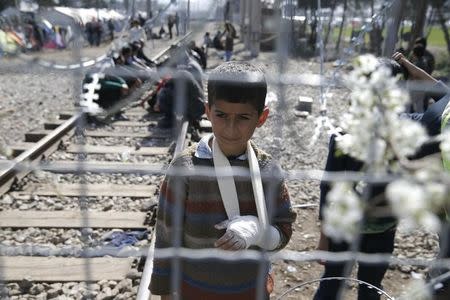Global peace forum vows to double efforts to tackle terrorism and migration

By Belinda Goldsmith STOCKHOLM (Thomson Reuters Foundation) - An international peace forum vowed on Tuesday to double efforts to combat the twin threat posed by terrorism and mass migration in rich and poor nations by tackling the causes of conflict and poverty. Leaders of the International Dialogue on Peacebuilding and Statebuilding (IDPS) said rising numbers of conflicts and extremism - such as the attacks in Paris and Brussels - coupled with migration had changed the global landscape. Studies show 2014 was the most lethal year since the end of the Cold War while conflict, poverty and climate change have forced 60 million people from their homes - the highest level since World War Two - creating volatility and instability. Isabella Lövin, Sweden's Minister for International Development Cooperation and forum co-host, said nations must join forces to address the "growing challenges for humanity" or risk the increase of violence in all countries. "This is maybe the opportunity to see the world is one and we need to work longterm to help poor people in their countries and to create global security for all of us," she told the Thomson Reuters Foundation at the fifth global IDPS meeting. "The refugees that are coming into Europe right now remind us that the war going on in Syria is not so far away ... and we do have the instruments to try to stop new conflicts erupting." She called for all nations to speed up and scale up efforts to meet global goals agreed by the United Nations last year to end poverty and inequality by 2030 and to use an IDPS blueprint, the New Deal, to get parties on the ground working to peace. The IDPS, launched in 2008 to encourage political dialogue for countries affected by conflict and fragility, includes more than 40 countries, nine multilateral organisations including the World Bank and United Nations and civil society groups. Lövin said the forum agreed on Tuesday to a "Stockholm Declaration" to double efforts to help fragile and conflict affected nations move towards peace through long term investment in institutions, programmes and support to alleviate poverty. The IDPS meeting is the first international peace forum since the United Nations' 193 member states agreed last year to 17 global goals, or Sustainable Development Goals (SDGs), to end poverty, equality, and promote peace by 2030. United Nations Deputy Secretary General Jan Eliasson said the world was at a "critical juncture", facing turmoil and risks from various forms of violence as well as "glaring inequality". "We see civilians continue to pay the highest price in today's crises ... We have to confront these threats together," said Eliasson, a former Swedish foreign minister. But he said there was some good news with peace talks in the works for Syria and Yemen and agreement on the U.N. global goals building momentum for greater efforts to tackle poverty and conflict as a global issue. "If we live up to these intentions we could turn a different direction," he told the Thomson Reuters Foundation. In this new global landscape, Lövin said there had never been a greater need for global cooperation to address the root causes and drivers of fragility and conflict. "I hope this gives a new injection into the thinking of how we provide development aid and also how we do peacekeeping and peacebuilding," Lövin said. (Reporting by Belinda Goldsmith, Editing by Katie Nguyen. Please credit the Thomson Reuters Foundation, the charitable arm of Thomson Reuters, that covers humanitarian news, women's rights, trafficking, property rights and climate change. Visit http://news.trust.org)

